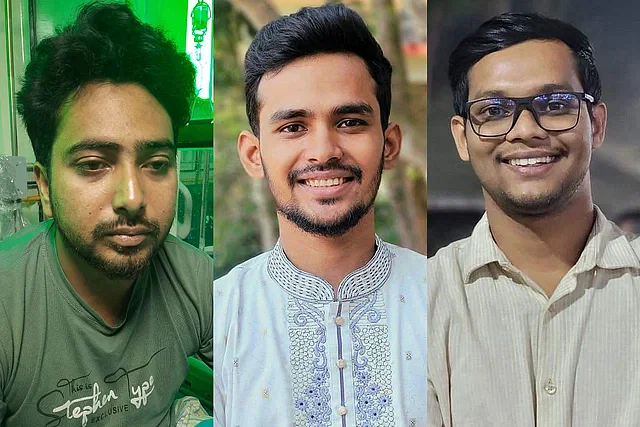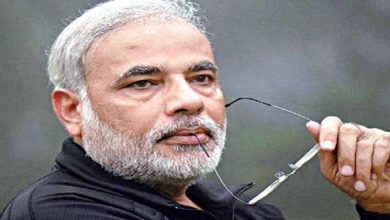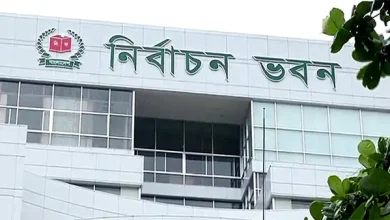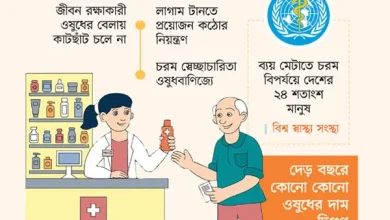Quota reform movement: Nahid, 2 other coordinators in DB custody

The Detective Branch (DB) of the police has taken three coordinators of the quota reform movement, including Nahid Islam, in their custody.
Earlier, a group of plainclothesmen reportedly picked up three coordinators, students of Dhaka University, from the Gonoshasthaya Nagar Hospital in the city in the afternoon.
Physicians of the hospital and relatives of a coordinator, who were present on the scene, confirmed the incident, saying they were taken away from the hospital around 3:30 pm on Friday.
According to on-duty physicians, some of the individuals identified themselves to be involved with the police’s Detective Branch (DB), while some others claimed to be from the force’s Counter Terrorism and Transnational Crime (CTTC) unit.
Asked about the incident, CTTC chief Md. Asaduzzaman told around 8:30 pm that they did not take any of the quota reform movement coordinators to their custody.
No other units of the Dhaka Metropolitan Police (DMP) confirmed about lifting the quota reform movement leaders until the filing of this report around 9:15 pm.
Later at night, DB acknowledged about taking them in their custody.
Speaking to around 11:30 pm, DB additional deputy commissioner Junaid Alam said that three coordinators have been brought into DB custody for security reasons. They will be asked if they have any information about the violence.
Nahid, Asif, and Abu Baker – they all are students of Dhaka University and key coordinators of the Anti-Discriminatory Student Movement that is leading the quota reform movement.
Following their complete shutdown programme and subsequent clashes, Nahid Islam was picked up from his friend’s residence in the Nandipara area of Khilgaon on 19 July. One day later, he was left in the Purbachal area of the city, with injuries in different parts of his body. He had since been receiving treatment at the Gonoshasthaya Nagar Hospital.
The two others – Asif and Abu Baker – were also abducted on the same day, and were released five days later. Asif had also been receiving treatment at the hospital since then, while Abu Baker was accompanying him there.
While visiting the hospital around 5:30 pm, it was learned that Nahid was in room no. 703 on the seventh floor of the hospital, accompanied by his wife, while Asif was in room no. 311 on the third floor with Abu Baker.
The plainclothesmen first took Nahid from his room, when his wife was asleep. Later, they went to Asif’s place and brought him along with Abu Baker out. A staff of the hospital was also picked up along with the quota reform movement leaders.
Nahid’s wife fell sick upon learning of the incident and is now being treated in the hospital, accompanied by a woman named Fatima Tasneem, who identified herself as Nahid’s sister.
Speaking to, Fatima Tasneem said she went to Asif’s room when they were being taken away. She witnessed four men threatening and forcibly taking Asif and Abu Baker out of the room, while the duo was refusing to go with them.
At one stage, she, along with the nurses, told the men that the patients had not been discharged yet, but they responded with threats.
“The men asked the nurse in-charge, ‘Do you know Counter Terrorism? Have any idea about it?’. They later took the two (coordinators) down,” said Fatima Tasneem, adding that the men were talking between themselves about seizing their mobile phones and taking them to another private hospital.
On the condition of anonymity, a physician involved in treating Asif said he noticed some unknown people roaming in front of Asif Mahmud’s Room around 7:00 am, and the number of people rose in the following hours. Some of them also asked the physician about his identity.
Around 3:30 pm, some people, claiming to be from DB and CTTC, asked Asif to go with them, and also asked the physician to stay out of the incident.
“They asked me to move away, but I remained steadfast in my duties towards the patient. I told them that I cannot let any patient go without discharging him. Asif was in such a bad physical condition that he could not be discharged. Something was injected in his body, though he had no injury marks,” said the physician.
He, along with other hospital staff, resisted the men, but had no choice but to discharge Asif on a risk bond.







